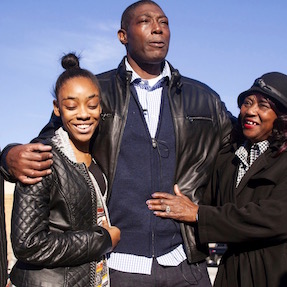
Darryl Fulton (center) was released from prison in November after DNA evidence cleared him in the grisly rape and murder of Antwinica Bridgeman. (Photo by Steve Matzker / Chicago Tribune)
The lawyer for a wrongfully convicted Chicago man who spent two decades behind bars for a crime he didn’t commit claims Chase Bank turned her client away twice when he tried to deposit a check from the state for his time in prison.
Chase has called the incident a simple “misunderstanding.”
Attorney Kathleen Zellner accused the bank of refusing to service her client, Darryl Fulton, because of his race, the Chicago Tribune reported. Zellner said the first time Fulton, who’s Black, tried to deposit the $169,876 check at a local branch, the bank said she would have to endorse it because her firm’s name was listed under his. Fulton’s name was printed on the “pay to the order of” line, however.
On the second occasion, Zellner said Chase argued that because Fulton signed above her name, the money would have to be deposited in her account. She said the incident further raised her suspicions that racism played a role in her client being turned away on not one, but two separate occasions.
“I find it particularly outrageous because he was wrongfully convicted,” Zellner told the newspaper. “The check is from the state of Illinois to him and I can’t attribute any other reason except they’re discriminating against him because he’s a Black male.”
Chase denied turning Fulton away twice but acknowledged its mistake in refusing to deposit his check the first time. In a statement, the bank said it “…should have accepted (Fulton’s) check during his initial visit” and claimed it “offered to deposit the check on his return.”
“[We] have reached out to him to clear up any confusion,” it said. “We regret the error and apologize for the inconvenience.”
Fulton said all he wants is to deposit his check.
“I just wanted to be treated like anyone else,” the exonerated man told the Chicago Tribune.
Fulton spent 23 years in prison before DNA evidence cleared him and another man in the brutal rape and murder of Antwinica Bridgeman, who disappeared after her 20th birthday party in 1994. Fulton and co-defendant Nevest Coleman were sentenced to life in prison, but prosecutors dropped their charges in November after new evidence linked the crime to a serial rapist, the Chicago Tribune reported.
A judge awarded both men with certificates of innocence. Both currently have pending lawsuits against the City of Chicago.